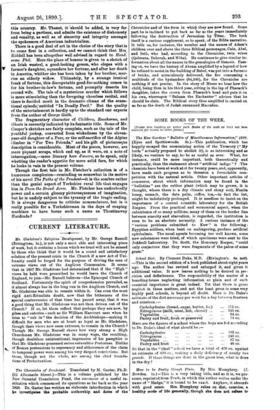CURRENT LITERATURE.
Mr. Gladstone's Religious 'Development, by Mr. George Russell (Rivingtons, Is.), is not only a most able and interesting piece of work, but it contains a lesson which we trust will not be missed by those who think that it would be a sound and satisfactory solution of the present crisis in the Church if a new Act of Uni- formity could be forged for the purpose of driving the men of extreme views out of the Anglican Communion. It seems that in 1857 Mr. Gladstone had determined that if the "High" views he held were proscribed he would leave the Church of England, to join—Mr. Russell believes—the Episcopal Church of Scotland. Fortunately the spirit of comprehension prevailed, as it almost always has in the long run in the Anglican Church, and Mr. Gladstone was able to remain within it. Can even the most rigid Anti-Ritualists doubt, now that the bitterness of the special controversies of that time has passed away, that it was a good thing that Mr. Gladstone was not then driven out of the Church ? If so, let them reflect that perhaps they are now, by gibes and outcries—such as Sir William Harcourt uses when he tries to " rub in" the decision of the Archbishops—making it difficult for men who are at heart as loyal as Mr. Gladstone, though their views now seem extreme, to remain in the Church ? Though Mr. George Russell shows how very strong a High Churchman Mr. Gladstone was in many ways, the resulting, though doubtless unintentional, impression of his pamphlet is that Mr. Gladstone possessed anima, naturaiit er Protestans. Dislike of Roman pretensions to supremacy and abhorrence of the claim to temporal power were among his very deepest convictions. But these, though not the whole, are among the chief founda- tions of Protestantism.


































 Previous page
Previous page